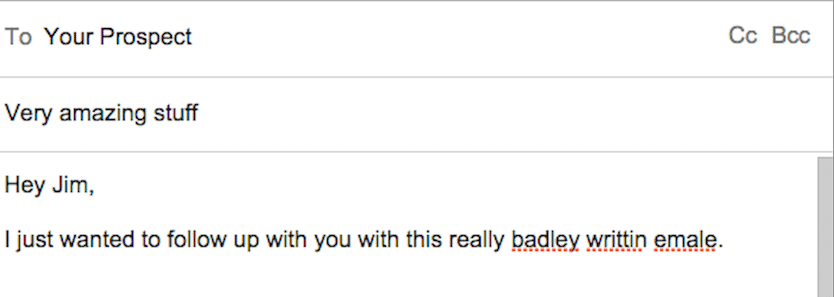Never Use These 7 Words in Your Emails
When we look through our inboxes, we’re shocked at the poorly written emails we get. At their worst, some are riddled with spelling errors and typos and others are cut and paste cookie cutter templates at best. Whether you write for a living or are basically an email professional, being calculating with your words and phrasing is important. How often do you receive a vague email that doesn’t clearly state why it’s important? How often do you just fire off an email without a second thought about its effectiveness? Sending an email is as simple as clicking a button, so it’s easy to become lazy in your choice of words and phrasing.
 When you consider all the emails you receive and read every day, you’ll realize that there are likely several little things about them that bug you. Whether it’s a word, a phrase or some expression that everyone under the sun uses, there are definitely things to avoid in your emails and
When you consider all the emails you receive and read every day, you’ll realize that there are likely several little things about them that bug you. Whether it’s a word, a phrase or some expression that everyone under the sun uses, there are definitely things to avoid in your emails and  other ways to write them more effectively.
other ways to write them more effectively.
Here are our top 7 words to cut from your email vocab to make your message more clear:
Words to avoid in your writing
1. Just – When it’s used as a filler word, “just’ weakens your writing. Often used in the first sentence of an email (such as “I just wanted to follow-up”), it almost sounds like you’re apologizing for contacting a prospect when instead you should be making them feel excited. By removing it you tighten your sentence and add gravity to your words.
2. Really – Using this word when you write can make your emails sound too conversational. It’s something we use for emphasis when we talk (such as “that flower is really beautiful”) but when you use “really” in text, it’s feels informal and unnecessary. Try removing it—your email will deliver the same message and have more impact.
3. Very – Following the same principles as above, “very” is a filler word that can be cut to make sentences more succinct.
4. Quite – We use “quite” in a sentence when we want to say “a bit” or “completely” or “almost.” The problem with “quite” is that it’s often unnecessary. Whenever you want to use this word, ask yourself if it’s actually adding meaning to the sentence or just taking up space.
5. Amazing – This word is used too often and as a result it’s importance has become diluted. The original meaning conveys surprise or wonder but if you use it too much, it just feels dull and common. Cut it or find a more specific word to describe what you are feeling.
6. Literally – The only appropriate way to use “literally” is to clarify the meaning of something when it may otherwise be interpreted as metaphor or exaggeration. However, most people add it into a sentence when they don’t need to and end up sounding like a teenage girl. Avoid this one completely.
7. Stuff – “Stuff” (and on a similar note, “things”) is a word that can always be replaced. It’s too generic and does not help you specify what you’re offering a client or coworker. Find a word that is more direct so your point is clear and you’re communicating with meaning.
What to remember in your writing
- Keep your language positive by removing “actually/but” – If you’re using emails to respond to people, always frame what you’re saying in a positive light. Words like “actually” and “but” can distract from a positive vibe. For example, the sentence “This was great, but can you change x?” has a subtle, different meaning from “This is great, let’s change x and it will be good to go.” Because the word “but” suggests a change of mind or a contradiction, it can feel like a criticism. Even though both sentences have the same overall meaning, removing the word “but” keeps things a bit lighter.
n - Be direct about tasks at hand by cutting out the word “etc.” – When you use the word “etc.” in your subject line or when describing possible options, it just makes your message vague. Instead of saying something like “Meeting to discuss projects etc.” say something like “Meeting to discuss projects from September and October.” Be specific so the recipient understands what you’re asking.
n - Remove the word “urgent” – If you’re under pressure and need something to get done, instead of emailing your coworker with the subject line “URGENT.” Instead, use the word “Today” or “Important.” The word “Urgent” only induces panic, which doesn’t help anyone get anything done. If something is truly urgent, speak to them in person. Otherwise use words that make it clear the task is a priority.
Regardless of how long you’ve been writing for, being aware of your word choices is important. Phrase your sentences carefully, keeping the point of your email clear. Remember, people are busy. If you make it easy for them to understand what you’re saying and asking for, it makes it easy for them to respond effectively. So start cutting out these seven filler words and be a more effective communicator.
Read more: Why No One’s Responding To Your Cold Emails